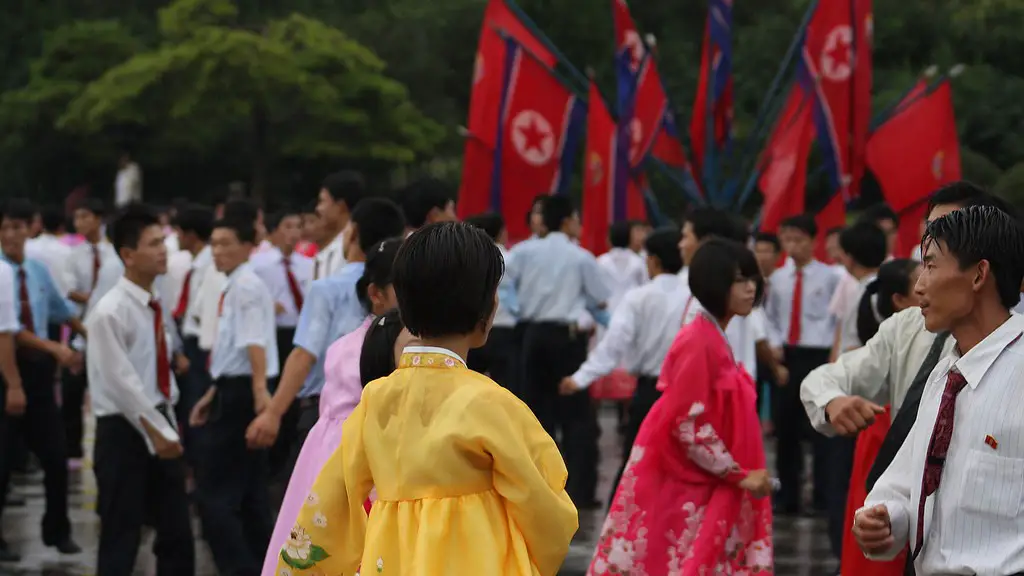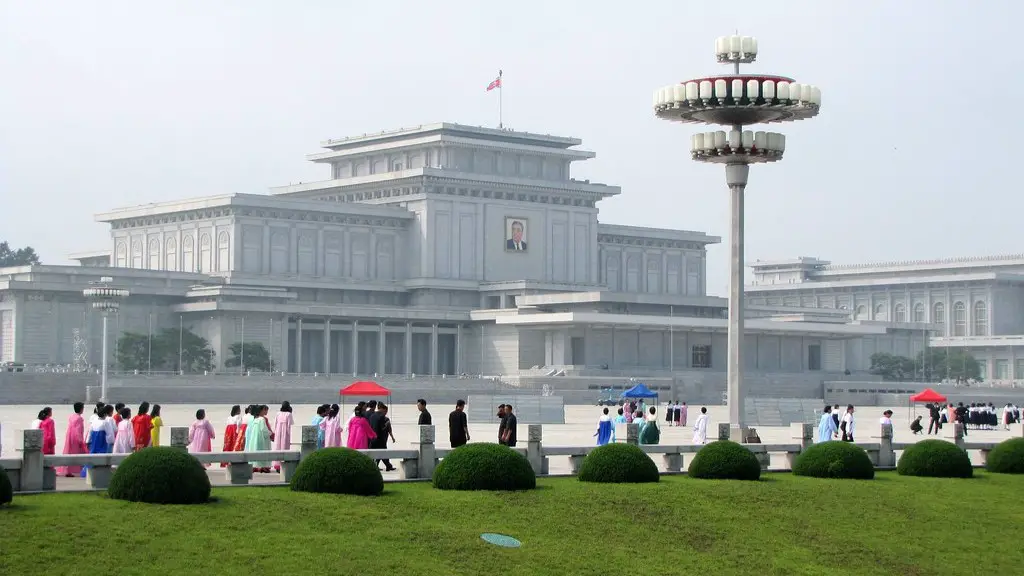Origins of North Korean Communism
North Korea has a long history of communism. Leading up to and during World War II, Korea was occupied by Japan. During this time, simmering discontent with Japanese rule fuelled an anti-Japanese independence movement. As Japan was defeated in 1945, the country was divided along the 38th parallel, with the northern half of the country becoming known as the Democratic People’s Republic of Korea, or North Korea.
With the end of World War II and the official establishment of North Korea, the Allies encouraged the formation of a unified, independent, and democratic Korea. This vision, however, expired as the Cold War transformed into a confrontation between the Soviet Union and the United States of America.
Cold War Politics and the Ideology of North Korea
North Korea’s leadership, frustrated by the United States’ refusal to consider the possibility of a unified and independent Korean state, turned to the support of the Soviet Union. In exchange for military support, the Soviet Union sought to leverage its position to establish a communist government in the country. Seeking to secure a foothold in East Asia, the Soviet Union attempted to install communist governments in the nations under its sway, including the nations which formerly composed the defeated Japanese Empire.
North Korea’s final commitment to communism was solidified when, in December 1945, the newly formed communist party of North Korea, the Workers’ Party of North Korea (WPK) drafted the “Ten Principles for the Establishment of a Monolithic Ideological System.” These principles became the framework for Kim Il Sung’s ideology, a mix of Korean nationalism and Marxism-Leninism. The Korean War, which broke out in 1950, cemented Kim Il Sung’s authoritarian rule in North Korea, and the nation’s de facto adherence to communism.
The Impact of the Soviet Union on North Korean Communism
Between 1945 and 1948, Soviet Union personnel and advisors decided on major economic and political policies in North Korea. It was during this time that Stalinized economic policies were introduced and certain economic infrastructure was constructed. Furthermore, the Soviet Union provided North Korea with a framework to establish its own Constitution. These policies dramatically altered the original framework of democratic policies pursued by the United States, instituting a centrally planned system of production and a single-party communist system.
In the years that followed, Soviet Union economic and political patronage allowed North Korea to develop into a powerful communist state. The economic infrastructure, involving the nationalization of Korean industry, was developed, and a variety of socialist political institutions and practices, such as the North Korean cult of personality, were established. The Soviet Union focused its resources heavily on North Korean security apparatus, particularly the North Korean army, which proved invaluable in the Korean War.
The Legacy of North Korean Communism
Traditionally viewed as a potent ideological and military stance, North Korea remains a communist state to this day and is one of the world’s most isolated countries. North Korea is a highly centralized one-party state, where a powerful personality cult is dedicated to the dynasty of Kim Il Sung and his descendants.
It is an economy characterized by a strong emphasis on government central planning and totalitarian control of the means of production, where the state imposes strict limits on foreign investment and trade. The country’s activities are centrally directed and strictly monitored, while citizens’ everyday lives remain heavily regulated.
Impact of North Korean Communism on the Economy
North Korean communism has served to bring about a highly centralized economy, with tariff and subordination of citizens and the business sector to the state. This has had a direct impact on the economic performance of North Korea, consistently driving down the country’s economic strength.
In the aftermath of the end of the Cold War, the lack of economic liberalization within the North Korean economy effectively made it a virtual economic backwater, producing significantly lower outputs and wages than it would otherwise have achieved in the face of market reforms. This dismal economic performance has been made worse by the vast over-cultivation of the nation’s arable land, coupled with the mismanagement of economic resources under Kim Il Sung and subsequent ruler Kim Jong Il.
North Korean Communism’s Impact on Citizen Rights
North Korean communism has been used as a means to impose limits on the rights of citizens, to the point where, in all aspects, the rights of citizens appear severely restricted. These restrictions have manifested in numerous ways, ranging from limits upon the practice of religion to severe punishment for the exercise of speech and press freedoms.
Furthermore, the state has imposed severe limits upon North Korean citizens’ ability to travel, with citizens’ independence from state control being strongly discouraged. This deliberate policy has served to severely limit the freedom of movement of North Korean citizens and to keep them completely dependent upon the state.
The Suppression of Dissident Voices and the Reality of North Korean Life
North Korean communism has served to suppress dissident voices of those largely opposed to the state’s power, in the case of imprisoned political dissidents, and those attempting to escape the country’s oppressive environment. Thousands of political prisoners continuously live under deplorable conditions in the country’s inhumane prison camps and are subject to harsh punishments – including torture – for any attempt at opposition to the Kim dynasty.
Outside of these prison camps, the state’s oppressive policies remain harsh. Daily life is characterized by severe surveillance, limits upon freedom of movement, and severe control of information sources. In an effort to control the political and social message of the state, the North Korean government has enforced strict limits upon the media.
The International Response to North Korea’s Communism
The international community has constantly reacted to North Korean communism in a variety of ways, with the international community primarily responding with a desire for peaceful resolution. A variety of international organizations, such as the United Nations, have placed sanctions upon North Korea, in response to its violations of international law.
In addition, diplomatic negotiations have been undertaken in order to peacefully resolve issues surrounding the country’s nuclear program. For their part, North Korean leaders have remained steadfast in their commitment to the economic command system, despite international disapproval and criticism.
The Unification of North and South Korea
Due to the separation of North and South Korea, South Korea has been able to develop a vibrant capitalist economy, with high economic growth rates and a booming democracy. As such, the reunification of North and South Korea is not seen as an immediate goal, due to the significant economic disparity between the two Koreas.
In its place, South Korea has offered economic cooperation packages in the form of investments and joint industrial development, in a bid to improve the North Korean economy. This measure has been met in North Korea with mixed reactions, but appears to be the most realistic option for achieving unification.
The Prospect of Change within North Korea
There is cautious optimism that North Korea could move away from its current oppressive and communist environment. Despite the state’s history of severe repression and oppressive policies, an increasing number of organizations have been able to access the North Korean population, providing those living there with access to new technology and information.
Recent reforms, most of which are concentrated in the economic realm, have allowed for the opening up of markets, the introduction of new technology, and a decrease in state control over the economy. Whether such measures will prove to be successful or will result in further human rights abuses, however, remains to be seen.


